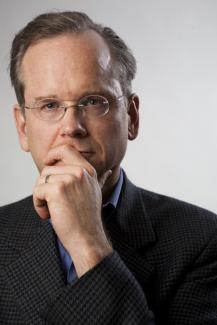“Institutional corruption” is the product of legal, even currently ethical influences that undermine the effectiveness of an institution, especially by weakening its public trust. Lawrence Lessig explores the application of this concept to a wide range of important public institutions with the aim to establish both the distinctiveness of the conception and its particular relevance to modern American life. Its very character saps the ordinary mechanisms by which institutions respond to charges of “corruption.” And as Lessig argues, the conception shows the need for a different perspective on the idea of institutional ethics — one focused less on the behavior of good or bad souls, and more on the consequences of institutional design.
Lecture 1
October 16, 2014
The Paradigm Case: Congress
Few institutions better illustrate the conception of institutional corruption than Congress. Congressional campaigns are privately financed. That influence is legal. If done openly, it is perfectly ethical. But the systemic consequence of the particular pattern of funding that has evolved radically undermines the capacity of Congress to serve its purpose.
Lecture 2
October 23, 2014
Finance
At the core of the idea of institutional corruption is the identification of an institution’s purpose; institutional corruption is a deviation from that purpose. The institution of finance—referring to the mix of government and large financial institutions—betrays the difficulty of identifying institutional purpose. On one conception, modern finance is a perfect example of institutional corruption. On another, it is not. This Berlin Family Lecture explores that ambiguity, not only to understand finance better, but also to mark the limits in the utility of the idea of institutional corruption.
Lecture 3
October 30, 2014
Media
We are just leaving a time when the purposes of media—by which is meant the presentation of news affecting the public interest—was relatively clear, and are entering a time in which achieving that purpose with traditional institutions will seem impossible. The causes of these changes are largely exogenous to the institutions of media. But the consequence so far is to sap them of a value which may, for a brief period, have defined the media within our immediate past.
Lecture 4
November 6, 2014
The Academy
The institutional purpose of the academy is relatively clear, but in the dynamic to fund research, and the institutions within which it happens, there is an obvious and growing tension. Commercial interest impacts the integrity of scholarship, though differently for different parts of the academy. That impact is an instance of institutional corruption, and the differences among the different parts of the academy are a source for understanding potential remedies.
Lecture 5
November 13, 2014
Remedies
In this final program of the 2014-2015 Berlin Family Lectures, Lawrence Lessig introduces remedies to the dynamic described in the previous four weeks. From this range, he will identify patterns of intervention that could correct institutional corruption, and the beginnings of a metric to evaluate those interventions.
Video
About Lawrence Lessig

Lawrence Lessig is the Roy L. Furman Professor of Law and Leadership at Harvard Law School, director of the Edmond J. Safra Center for Ethics at Harvard University, and founder of Rootstrikers, a network of activists leading the fight against government corruption. He has authored numerous books, including Republic, Lost: How Money Corrupts Our Congress, Code and Other Laws of Cyberspace, Free Culture and Remix.
Lessig serves on the boards of Creative Commons, AXA Research Fund, iCommons.org, as well as on the advisory boards of the Sunlight Foundation, the Better Future Project and Democracy Café. He is a member of the American Academy of Arts and Sciences and the American Philosophical Association; has received numerous awards, including the Free Software Foundation’s Freedom Award, Fastcase 50 Award; and is one of Scientific American’s Top 50 Visionaries.
Lessig holds a BA in economics and a BS in management from the University of Pennsylvania, an MA in philosophy from Cambridge and a JD from Yale. He was a professor at the University of Chicago Law School from 1991-1997. Prior to rejoining the Harvard faculty, Lessig was a professor at Stanford Law School, where he founded the school’s Center for Internet and Society. He clerked for Judge Richard Posner on the 7th Circuit Court of Appeals and Justice Antonin Scalia on the United States Supreme Court.
